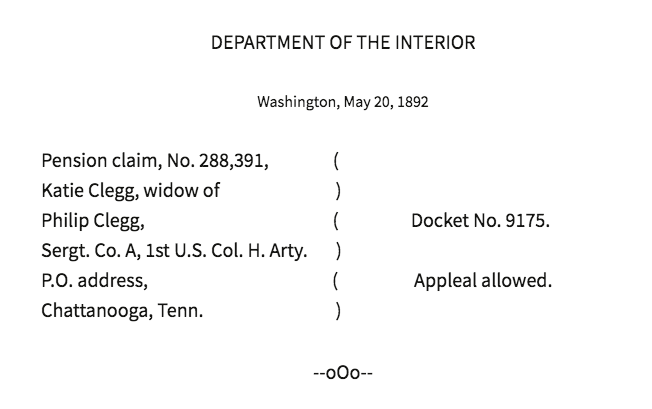
The Commissioner of Pensions,
Sir:
I return herewith the papers in the claim of Katie Clegg, No. 288,391, examined in connection with an appeal entered from the adverse action of your Bureau.
The records of the War Department show a service of the soldier from Feb. 4, 1864, to Feb. 19, 1866, when he died by reason of small pox.
The appellant filed her claim for a pension, as the widow of the soldier, in 1881, and the same was rejected in 1891, upon the ground that the claimant was not the legal widow of the soldier.
The contention of the appeal is that an injustice was done the appellant by the adverse action of your Bureau, and that in fact she is the widow of the soldier upon whose death the claim for a pension is made.
The claimant and the soldier were both slaves, and the only ceremony of marriage which is claimed to have been preformed was by the master, and in the period when both were held as slaves.
The claim of this alleged widow has been twice referred for a special investigation, to determine the question of slave or other marriage.
From the evidence thus obtained and otherwise filed in the case, it appears that this claimant and the soldier were both owned by one master in company with about one hundred other slaves. The claimant then being a house-servant, (seamstress), and the soldier a wagoner and sometimes acting as a coachman.
Neither of these two persons are shown by the evidence on file as having had martial relations with any of the other slaves, nor will the evidence in the case show as a fact that these two persons, while slaves, had martial relations, or were in any sense considered as husband and wife.
Whether as a fact, the claimant and the soldier were married by the master, in accordance with the customs of slave times, cannot be proven, in as much as the master is dead and no witnesses were present when the alleged ceremony was performed. It is shown by witnesses, whose testimony cannot be ignored, that the claimant and the soldier, at the date of his death, were recognized as husband and wife, and no good reason appears why this relation, at said date, is not as fully warranted as it might have been or possibly was, prior to the date of enlistment.
At the time the slaves, who were upon the plantation were this claimant and the soldier were owned, were dispersed by the advent of the Union Army in 1863, this claimant went to Chattanooga, and after the regiment to which the soldier belonged went to Chattanooga and was stationed there, these two parties met, and from this time they assumed the relation of husband and wife. That this relation was known and recognized by the soldier’s comrades and officers is clearly established – one of the regulations of the camp being, that none but married women whose husbands were stationed therein could be admitted. This claimant is shown by the evidence to have been admitted to the camp and to have occupied quarters therein with the soldier, as his wife; and it is also shown that she was with him when he was removed to the hospital. The relation which thus existed, and was recognized as lawful in these two parties, is one which Sec. 4705, R. S. apparently contemplates; and while this relation is not established as having existed in fact at the date of enlistment, yet, during a portion of the period of the soldier’s service it existed and so existed at the date of his death.
Some doubt has been thrown upon the merits of this case by the negative testimony of the claimant’s former mistress, who does not remember the circumstances surrounding the slave life of the claimant and the soldier; but, in this respect, she also expresses ignorance as regards the other slaves who were owned by her husband. It further appears that, in 1872, the hon. Second Auditor of the Treasury paid to a brother and sister of the soldier arrears of pay, upon evidence to him satisfactory as to the fact of the soldier’s celibacy. One of the witnesses was the former owner of the soldier, and when the soldier died in 1866, the laws of many of the Southern states did not recognize the marriage of people of color.
The pension laws recognize a condition as sufficient to admit a pensionable status and the condition of this claimant at the date of the soldier’s death is held as coming within the purview of Sec. 4705, R. S., and therefore, the action of rejection of the appellant’s claim is overruled and set aside.
You are therefore requested to issue a certificate for a pension in favor of the appellant as the widow of the deceased soldier.
Very respectfully,
Cyrus Bussij
Assistant Secretary
What a super and final ending. Sadly to be short lived.
This isn’t quite the end. And you are right.
This is such good news in this poor woman’s life!
Yes. Finally.